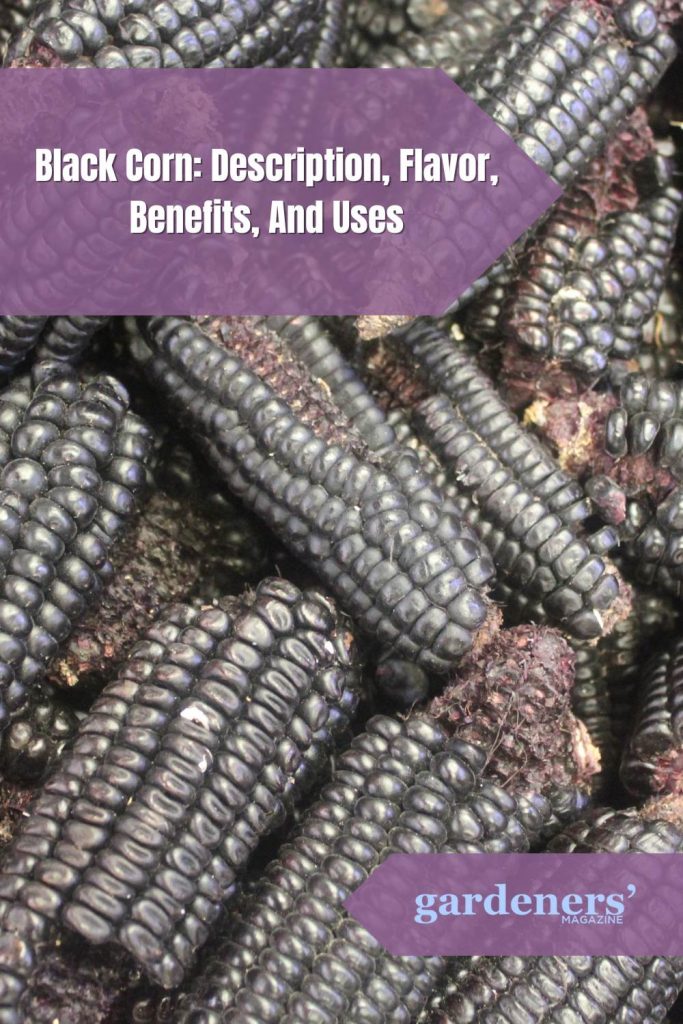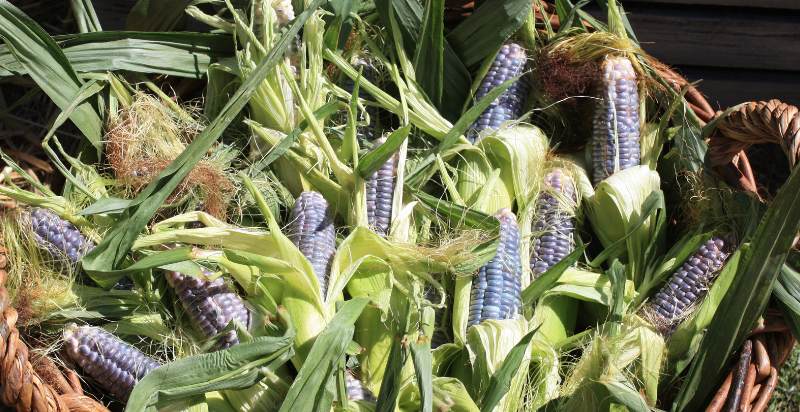Black corn is a unique variety of corn with a distinct black color on its kernels. It is an ancient maize that has been grown in Mesoamerica for centuries. The grain has been used as food, for making beverages, and for spiritual purposes. Black corn, also known as “cascara” or “black flint,” is an excellent source of vitamins, minerals, and antioxidants. It has also been used for medicinal purposes in traditional cultures. In this article, we will discuss the origin of black corn, its nutritional value, health benefits, and culinary uses.
What is Black Corn?
Black corn is a type of maize (Zea mays L.) that has been bred to have an exceptionally dark kernel color. It is traditionally grown in Mexico and Central America and can also be found in some parts of South America. Black corn tastes sweeter than yellow or white varieties, and its kernels are larger and thicker. It is often used to make tortillas, tamales, arepas, and other traditional dishes in Mexico. Additionally, it has gained popularity among chefs worldwide for its unique flavor and texture.

History and Origins of the Black Corn:
The origins of black corn date back to ancient Mexico, where the Aztecs and other indigenous populations used it as an important staple food. The maize (corn) plant itself is believed to have originated in Central America around 9,000 years ago and quickly spread across the continent due to its hardiness and nutritional value.
Black corn is thought to have been developed sometime during the first millennium AD and was likely used for food and religious ceremonies.Black corn has long been associated with divine protection and purification in Mexico. In traditional Aztec beliefs, it was believed to be a gift from the gods that would bring good fortune and healthy harvests. For this reason, black corn kernels were often used in rituals such as the Day of the Dead and even featured on Aztec masks and jewelry.
Black corn is still a staple food in Mexico and many other parts of Latin America. It can be found in tortillas, tamales, pozole, salsas, atoles, and other dishes. Though less widely available in the United States, it has become popular among those exploring Mexican cuisine. It can be found in specialty stores or online.
Cultivation & Growing Conditions of the Black Corn:
Black corn is a warm-season crop and grows best in climates with long, dry summers. It needs soil that drains well and has a pH range of 6.0 to 7.5. For optimum growth, the soil must be rich in organic matter and have sufficient aeration and drainage. Adequate moisture is also important, especially during the flowering and grain-filling stages. Irrigation may be necessary in dry climates or during times of drought.
Black corn is usually planted early to mid-spring when soils warm to at least 60°F (16°C). It can be grown alone or intercropped with other crops such as beans, squash, and melons. Harvest usually occurs in late summer or early fall when the seeds are dry and fully mature.
Appearance of the Black Corn:
The Black Corn has an unmistakable appearance. Its tough black husks cover the kernels to protect them from damage and keep them fresh for longer. The color is a deep, dark black that stands out against other types of corn.
The texture is also unique, with a soft outer layer and crunchy inner kernel. The firm kernels are tightly packed, giving it a compact shape. The flavor is nutty and earthy, with notes of sweetness when cooked. This unique combination of texture and flavor makes Black Corn an ideal ingredient for various dishes.
Taste of the Black Corn:
The flavor of black corn is earthy and complex. It has a firm texture that gives way to a creamy and nutty flavor when cooked. It also has a hint of sweetness, which makes it the perfect addition to sweet dishes like creamed corn or chowder. Its unique flavor also stands out in savory dishes, such as enchiladas or tacos.
Plant Characteristics of the Black Corn:
Black corn is a type of heirloom maize or flint corn. It has a hard outer hull and small kernels that are usually black, purple, blue, or striped. The kernels do not burst open when cooked like other maize, so they retain their shape and texture when boiled or steamed.
Health Benefits of the Black Corn:
Black corn is a vital source of antioxidants, which can help protect the body from diseases like cancer and diabetes. It also contains carotenoids and polyphenols, which can help reduce inflammation. This unique type of maize is high in fiber, which aids digestion and helps control cholesterol levels.
Additionally, black corn is rich in iron, magnesium, and zinc. These minerals help maintain healthy blood pressure, support the immune system, and promote cognitive health. Eating black corn regularly can also help increase energy levels and decrease fatigue. Lastly, black corn contains a significant amount of vitamins B6 and E, which are essential for maintaining optimum health.
Where are Black Corn Grown and Harvested?
Black corn is primarily grown in Central and South America, with Mexico being the biggest producer. Peru, Ecuador, Guatemala, Panama, Honduras, Costa Rica, and Colombia are the main countries that grow black corn. In addition to these countries, some African nations, such as Kenya and Tanzania, produce black corn.
Black corn harvests occur in late summer or early fall, depending on the region. The plants are cut down, and the ears of corn are collected one at a time by hand. After collecting the ears, they are dried and stored for later use. In some cases, the kernels are removed from the cob and roasted before being packaged for consumption.

Where can the Best Quality Black Corn be Found?
The best quality black corn can be found in Mexico and Central America, as these regions have the most experience growing and harvesting this type of corn. In particular, Oaxaca, Guerrero, Michoacan, Puebla, and Veracruz states are known to produce some of the highest-quality black corn available.
Additionally, Peru, Ecuador, and Bolivia are known to produce excellent varieties of black corn. It is important to source the product from a reputable dealer to ensure that the quality is high and that it has been grown organically. Many specialty stores in North America, Europe, and elsewhere also carry black corn products.
What is the Best Way to Store Black Corn?
The best way to store black corn is in an airtight container in a dry, dark location. It should also be kept away from harsh sunlight and temperatures to avoid spoiling. It must be consumed within a year to ensure the product’s maximum freshness and flavor. To prevent the product from becoming moldy or rotten, it is also crucial to maintain it as dry as possible.
It is also important to store the product to prevent cross-contamination with other food items, such as keeping it separate from raw meats. Finally, black corn should be stored away from strong odors and fragrances so that its unique flavor is not affected.
How to Use Black Corn with other Fruits and Vegetables?
Black corn can be used with a variety of fruits and vegetables to create unique dishes. For instance, adding some chopped black corn kernels to a salad made of apples, carrots, cucumbers, and cherry tomatoes can give it an unusual twist. Black corn also pairs well with summer squashes like zucchini or yellow squash in stir-fries or pasta dishes.
It’s delicious when added to sautéed bell peppers and onions in tacos or burritos as well. And for those nights when you’re looking for something truly different, try incorporating some black corn into your next pizza topping – it makes a surprisingly tasty combination! No matter how you use it, one thing is certain: cooking with black corn is sure to add a little extra flavor to your meals.
Conclusion:
Black corn is a nutritious and unique food that can be enjoyed in various dishes. However, it requires careful storage to keep its flavor and freshness intact. To ensure the best taste and texture, black corn should be stored in an airtight container away from light, excessive heat or cold, moisture, cross-contamination with other foods, and strong odors or fragrances. With these tips in mind, enjoy the deliciousness of black corn.
- Everything You Wanted to Know About Red Tamarillos - June 2, 2025
- A Guide to Tulips: Everything You Need to Know & More… - June 2, 2025
- Guanabana: Description, Flavor, Benefits, And Uses - May 27, 2025

3 thoughts on “Black Corn: Description, Flavor, Benefits, And Uses”
Comments are closed.